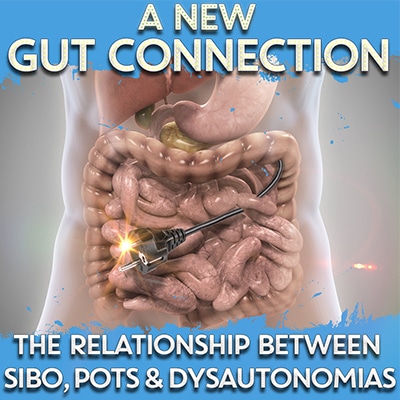SIBO, POTS, and Dysautonomias: A New Gut Connection

Oh the wonderful world of medicine – there’s always new connections being made, uncovering some truth about mysterious disorders.
A new connection emerging from research has shown a possible connection between the bacteria in your gut and dysautonomias, which are disorders coming from your autonomic nervous system.
This is still “hot off the press” research, but it’s worth looking into since your gut bacteria is easily manipulated through diet, supplements and environmental inputs – like exercise and stress levels.
You have multiple nervous systems who all talk to each other. Whether it be through hormones, enzymes, gut bacteria, electrolytes, or stressors – your entire body is connected.
Even when you’re sound asleep these factors are still on “work mode” keeping you alive through automatic movements.
Your gut is part of your enteric nervous system (ENS) consisting of 100 million neurons, trillions of bacteria, and 3.3 million genes – that’s 150 times larger than your human genome.
And on top of that an overwhelming rate – 99% – of your genes actually come from your gut bacteria. This is all the reason why your gut has been called your “second brain.”
It is a powerful system affecting your body’s immune system, metabolism, nutrition, digestion, and physiology. So it’s important to keep a good balance of healthy bacteria in your gut to keep all systems working smoothly.
What Does the Gut Have to Do with Dysautonomia?
Dysautonomia is an umbrella term used to describe multiple medical conditions involving your autonomic nervous system (ANS). Your ANS controls your “automatic” functions of your body that you don’t have to consciously think about such as:
- Heart rate
- Blood pressure
- Breathing
- Digestion
- Temperature regulation
- Dilation
Your gut communicates to your central nervous system (CNS), which consists of your brain and spinal cord, through your ANS via the vagus nerve. This is a two-way street of communication – meaning either system can affect the other.
Knowing this, you might be less surprised to hear that an imbalance in your gut bacteria has been linked to neurodegenerative disorders.
We know our body is connected.
We also know that each nervous system is connected by a bidirectional means of communications via nerves.
And when our enteric nervous system – your gut – is in direct contact with your autonomic nervous system, imbalance could cause it to go haywire.
What is POTS? Plus POTS Causes and Symptoms
One of the most common dysautonomias is postural orthostatic tachycardia syndrome (POTS). POTS affects 70 million people worldwide and is also commonly linked with people who have an autoimmune disease.
Postural orthostatic tachycardia syndrome is diagnosed when a patient’s heart rate increases from their resting heart rate by 30 beats per minute or more upon standing. Or an increase to over 120 beats per minute when standing.
POTS signs and symptoms include:
- Increased heart rate
- Dizziness
- Fainting
- Gastrointestinal issues (cramping, bloating, diarrhea, constipation – all signs of SIBO)
- Shaking and sweating
- Weakness and fatigue
- Shortness of breath
- Difficulty sleeping
- Flushing
Dysautonomias are usually inherited.
But those that are not inherited are normally due to a degenerative disease, result from injury, certain diseases, or prolonged inflammatory reactions.
Basically, doctors can’t pinpoint one cause. As with any syndrome or disease, this is usually the case because there’s no “one cause fits all.”
One groundbreaking study linking the gut to dysautonomia reveals how a patient who suffered from POTS was nearly symptom-free after treating her small intestinal bacterial overgrowth (SIBO).
Her gut health was directly affecting her autonomic nervous system! This is just the breakthrough some patients need to treating and healing their dysautonomia.
SIBO and Dysautonomias Connection
SIBO, which is an overgrowth of bacteria in your small intestine have been shown to possibly lead to autoimmune disorders and neurological issues such as Alzheimer disease Parkinson disease, and fibromyalgia (both are forms of dysautonomia).
With some cases of dysautonomias, various stresses on their immune system cause an increase of norepinephrine in the body. This increase of norepinephrine from their sympathetic nervous – one branch of the autonomic nervous system – causes them to respond in the flight-or-fight reaction.
During times of stress, your body has an influx of norepinephrine. With this being said, remember that two-way street?
Between your gut and your brain?
Research shows that your gut bacteria can sometimes be linked to these high-stress time releasing tons of norepinephrine. This is also another major connection between small intestinal bacterial growth and POTS.
In Dr. Lenny Weinstock’s research, he found 27 out of 35 patients with postural orthostatic tachycardia syndrome also had small intestinal bacterial overgrowth.
An alarming 69% of POTS patients had SIBO. This is the beginning of research for SIBO and dysautonomias connection. We are just beginning to scratch the surface, hopefully, to unveil a root cause for these patients.
Histamine Intolerance and POTS
Another solid connection is the connection with mast cell activation syndrome (MCAS) and patients with POTS. This is because of the prolonged inflammatory reaction taking place in MCAS patients.
Histamines are released into your bloodstream due to inflammation or allergic reactions. But those with MCAS don’t ever “turn off” this release of histamines so there’s a major influx.
Symptoms of histamine intolerance look like:
- Fatigue
- Headache
- Vertigo
- Tachycardia
- Itching/Rash/flushing
- Abnormal cramps
- Anxiety
- Acid reflux
- Difficulty falling asleep
Small intestinal bacterial overgrowth can lead to leaky gut in certain patients.
This results when the permeability of the epithelial lining is compromised and allows for the passage of toxins, antigens, and bacteria in the lumen to enter the bloodstream thus creating a “leaky gut.”
This can lead to histamine intolerance and food intolerances like gluten in your system since your body is recognizing these things as bad. This constant attack with histamines can be causing the above symptoms.
Rebalance Your Gut Bacteria
One of the major complaints about dysautonomias and POTS patients is surprisingly not their heart rate or blood pressure issues, but their gastrointestinal issues.
Dysautonomias stop all motility in the gut, which could lead to SIBO in patients, but what if we look at the other side of the street?
Could SIBO be causing your dysautonomias/POTS?
The connection between SIBO and POTS is like peeling back a banana layer by layer until you find the root cause.
When doctors chalk up a syndrome like IBS, SIBO, POTS or any dysautonomias as an “autoimmune disease”, it’s because they are done peeling back the layers and have made up their minds.
But when you are struggling with POTS, you are struggling with the daily effects it has on you – and you are NOT done peeling back the layers.

Wow! This is an excellent article! I have Crohns and Fibromyalgia and through my research and “digging” I have never heard this! As an Registered Nurse, I’ve always dug for more info on my Crohns to start with and trying to link it with my Fibromyalgia. Thank you! This gives me hope! …and YES I take Atrantil!!! A huge game changer for my Crohns!
Hi Tonette,
Thank you for your comments and for being a valued customer! We are so happy that Atrantil is helping you! We are glad you like our blog topic. There is so much new information coming out daily and it is really amazing how important our gut health is to the rest of our body. Please feel free to respond with what other article topics you would like to see in the future!
Thank you and best wishes,
Team Atrantil
How do you clean your gut
Just heard of your product. Can’t wait to try it! I have hashimoto & constantly having stomach problems no matter what I try. Sure hope this will help me.
Hi Julie,
Thank you for trying Atrantil! We sincerely hope you are feeling better soon.
Best wishes,
Team Atrantil
Hola tengo disautonomia y SIBO. Quisiera obtener los nombres de los estudios relacionados con esta publicación.
Hola judit,
Gracias por contactarnos. Si hace clic en la pestaña “Recursos” al final del artículo, le dará enlaces a todos los estudios.
Gracias y los mejores deseos,
Equipo Atrantil
I have Methane SIBO. Recently tested at 90% on the breath test. I have chronic extreme bloating (look six months pregnant). Will Atrantil help me as it is not “occasional” bloating.
Thanks!
Sandra
Hi Sandra,
Thank you for your interest in Atrantil! Yes, Atrantil should help you. It is meant to assist with the build up of excess bacteria in the gut. If you take Atrantil regularly, you can see results as soon as twenty to thirty days.
–Team Atrantil
This is obviously too late in this thread to be effective however if someone has methane dominant SIBO its not bacterial; bacteria release hydrogen and it’s actually archaea (a different type of organism) that release methane. So, antibacterial agents do not typically methane dominant SIBO and could make symptoms worse if there are fewer bacteria from a treatment, this gives the archaea more room to thrive.
Hi Mlmann197,
Yes, you are correct! Thank you for your feedback. Small intestine bacterial overgrowth is caused by a proliferation of both “normal” bacteria and archaebacteria in the small intestine. Atrantil targets both the “normal” bacteria and the archaebacteria in the small intestine and gets them to go back into the colon where they belong. To learn more about this process, please check out our website at http://www.atrantil.ca.
Thank you and best wishes,
Team Atrantil
I have been diagnosed with Mast Cell Activation secondary to something else. That something else, I am sure, is SIBO. The SIBO has caused me to have leaky gut and my worst symptom of SIBO is high histamine. It is all connected. Hoping that taking Atrantil will heal my gut and help my histamine issue.
Hi Kristine,
Thank you for trying Atrantil! We wish you the best of luck in you health journey.
Best wishes,
Support Team
I have dysautonomia and had methane SIBO (probably still do). What else do you recommend besides Atrantil to fix it or is Atrantil enough by itself?
Hi Cara,
Thank you for your interest in Atrantil! In our clinical trials we had over 80% efficacy with Atrantil alone and therefore, did not test with any other products. We hope this helps to clarify. Please let us know if we can be of further assistance.
Thank you and best wishes,
Support Team
Cool – thank you! I already recommended it to one of my patients too.
Hi Cara,
That’s great! Thank you so much for your recommendation.
Best wishes,
Support Team
I had a right colectomy in 2018 for colon cancer. My complaint of bloating and nausea and changes in bowel habits was worked up with a breath test for SIBO, it is positive for hydrogen only. Things are greatly improved with diet changes, but my doctor did recommend I consider a course of Atrantil. What would you recommend?
Hi balkindanser,
Thank you for your inquiry. We have had success in people who suffer from bacterial overgrowth after a colectomy. If you have bloating and abdominal discomfort, with/without diarrhea, constipation ot both then Atrantil may be a solution for you. We hope this helps to clarify.
Best wishes,
Support Team